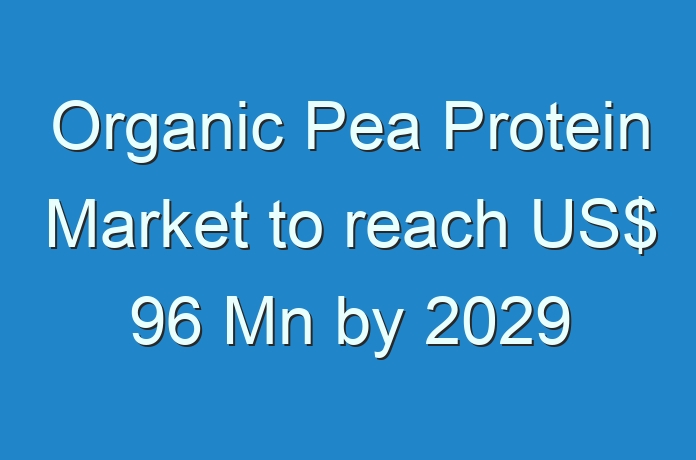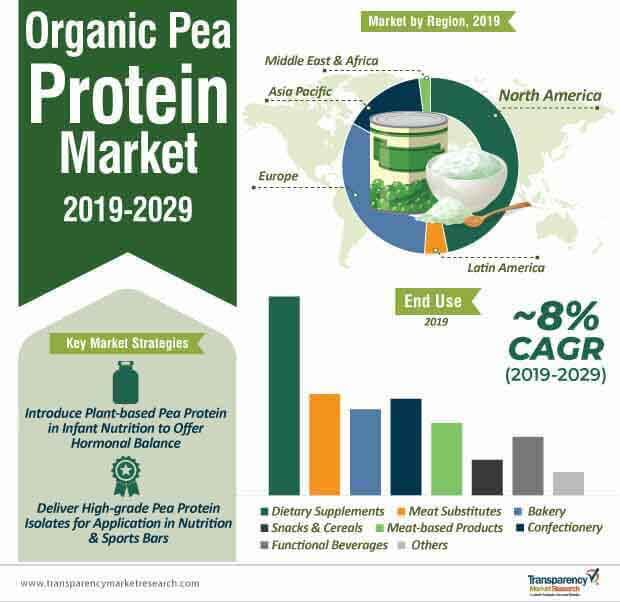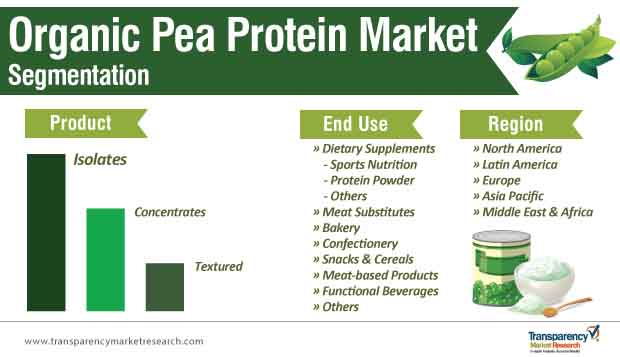
Infant Food Products Made from Plant-based Organic Pea Protein
The high protein content of organic pea protein has instigated players in the pea protein market to increase its application in dietary supplements, meat substitutes, and confectionaries. Manufacturers in the organic pea protein market are also increasing their production capabilities of infant nutrition. Organic pea protein is used as a substitute for soy protein to offer hormonal balance in infants. As soy contains phytoestrogens that create hormonal imbalance in babies, manufacturers are resorting to plant-based pea protein to produce baby food. For instance, Nature’s One – a producer of organic food products for infants, announced the launch of Baby’s Only Organic® Pea Protein Formula – the first-of-its-kind infant food product made from plant-based pea protein.
Since soy has the tendency to absorb minerals and contaminants from the soil during its cultivation, manufacturers in the organic pea protein market are streamlining their production processes by introducing pea protein in baby food. This practice will help improve the quality of infant food products and largely benefit consumers.

Request a sample to get extensive insights into the Organic Pea Protein Market
Pea Protein Isolates Increasingly Found in Dietary and F&B Applications
Manufacturers in the organic pea protein market are developing products that are more consumer-centric. They are also making conscious efforts to meet the needs of food and beverage (F&B) manufacturers. For instance, the dietary supplements sector accounted for the highest revenue in 2018, with a value of ~US$ 12 million in the organic pea protein market. This sector will continue to dominate the market throughout the forecast period.
Manufacturers are increasing their research capabilities to innovate in senior nutrition, sports nutrition, and gluten-free products. Weight management is one of the key drivers that has triggered the growth of the organic pea protein market. With increasing number of diet- and health-conscious consumers, manufacturers are increasing awareness about the ‘non-GMO’ labels for their products.
Consumers are increasingly demanding organic products that are sans artificial colors and additives. To address this trend, manufacturers are introducing organic pea protein isolates that replace a significant percentage of proteins in food products, without altering the color, taste, or texture of the ingredients. For instance, Ingredion – a leading ingredients solution company, announced the launch of VITESSENCE® Pulse 1803 organic pea protein isolate, which can be used in several food and beverage applications.
To understand how our report can bring difference to your business strategy, Ask for a brochure
Organic Pea Protein V/S Meat Substitutes: Which one Will Dominate Market Growth?
The desire for a healthier diet and concerns about climate change have also triggered the growth of the organic pea protein market. These aspects have catalyzed consumer interest in plant-based alternatives to manifest animal welfare, and farmers and society well-being. The proliferation of veganism has further created the scope for incremental opportunities in the coming years.
The production of pea protein is comparatively cost-effective as compared to wheat, corn, and soy. This is because the cultivation of peas requires less water; they are drought-tolerant and reduce the need for nitrogen fertilizers. However, insufficient supply of pea protein acts as a hurdle for manufacturers in the organic pea protein market. On other terms, stakeholders in the meat and dairy alternatives market could leeway out of this pain point to gain competitive advantage. Thus, manufacturers need to team up with existing market players to maximize the supply chain in the market.

Stuck in a neck-to-neck competition with other brands? Request a custom report on “Organic Pea Protein Market”
Analysts’ Viewpoint on Organic Pea Protein Market
Manufacturers in the organic pea protein market are developing a ‘bouncy’ mouthfeel of animal meat through plant-based alternatives. They are trying to meet consumer demand for plant-based meat without compromising on clean-label and non-GMO standards. The introduction of novel organic pea protein isolates is gaining prominence in powdered and ready-to-drink beverages, baked foods, and baking mixes. Consumers with lactose intolerance are benefitting from these isolates, as these isolates replace allergens such as dairy and egg proteins. However, the side effects of pea protein such as digestion issues, diarrhea, and gout may adversely affect the demand for organic pea protein products. Thus, manufacturers should educate consumers on the judicious consumption of pea protein, and encourage them to seek consultation before the consumption of pea protein.
Organic Pea Protein Market: Overview
- TMR has executed a research on the organic pea protein market, according to which, the market is estimated to reach ~US$ 45 Mn in 2019, in terms of value, and is anticipated to reach ~US$ 96 Mn by the end of 2029, at a value CAGR of ~8%.
- Surge in the demand for organic pea protein is expected to increase, owing to the increasing demand for products with higher nutritional content and natural and organic ingredients.
- Over the past few years, organic ingredients have been observed to showcase robust adoption in food and cosmetic industries. Due to this, the organic pea protein market is consequently projected to grow at a high CAGR of ~8% during the forecast period.
Organic Pea Protein Market: Frontrunners
- Isolates are anticipated to gain traction in the organic pea protein market over the forecast period, followed by concentrate products. Isolates of organic pea protein hold ~42% share in the overall organic pea protein market, which is expected to reach ~45% at the end of the forecast period.
- Organic pea protein has been used in different product manufacturing and as a substitute for many food materials. Organic pea protein used as a substitute for meat in the food industry is expected to show high growth in the coming years, and hold ~15% of the global organic pea protein market.
- Dietary supplements have been generating the highest revenue in the organic pea protein market, holding a market share of ~30%. These are expected to show lucrative growth during the forecast period, due to multiple uses of organic pea protein in the dietary supplement industry. They are used as sports nutritional products as well as other protein powders.
More Trending Reports by Transparency Market Research – https://www.prnewswire.com/news-releases/rising-focus-of-major-populace-to-lead-healthy-lifestyle-spurs-demand-for-low-calorie-food-market-tmr-301129990.html
Organic Pea Protein Market: Trends
- As per strict guidelines and organic standards, companies have to label their products appropriately. For instance, organic food products need to be labelled whether they are 100% certified or contain only organic ingredients. The availability of this information fulfills the demand from consumers who are seeking products with various health and nutritional benefits. Therefore, this shows the increasing popularity of private-label organic brands among consumers.
- Health concerns among the millennial population are growing rapidly, which has resulted in increased expenditure on natural and organic foods, as these are perceived to be free from hormones, additives, antibiotics, and non-GMO. These products are more environment-friendly, and made without any synthetic substances. Hence, consumers, especially the millennial age group, prefer organic products, and this trend is expected to increase the demand for organic pea protein in the global market.
- Consumer preference for organic food products is expected to witness a significant increase over the next couple of years. Manufacturers and suppliers of organic pea proteins are optimizing product offerings according to consumer demand. New manufacturers are entering the organic pea protein market, owing to high-profit margins, and the demand for natural and plant-based products in the food and beverage industry.
Organic Pea Protein Market: Strategies
- Many key protein manufacturers are adopting the partnership strategy to expand their business offerings and footprints around the world. A number of small organic pea protein manufacturers have partnered with medium- and large-level manufacturers to serve a larger customer base.
- Farbest Brands Company has partnered with Naturz Organics, which is an exclusive North American partnership that offers organic ingredients to the largest food and beverage manufacturers of North American and European companies.
- Companies also directly manage their entire supply chain networks, starting from managing seeds, growers, and manufacturing facilities, and also provide organic traceability and integrity directly from the farm to the finished products. This strategy helps earn customer trust, which, in turn, improves the customer base.
Target Regions for Organic Pea Protein Market
- In terms of value, North America has been estimated to represent the largest share in the organic pea protein market by the end of 2019, and is expected to dominate the organic pea protein market throughout the forecast period.
- Also, in terms of value, Europe has been projected to showcase the fastest growth during the forecasted period, due to the increasing consumption of natural and organic food ingredients in European countries.
Request for covid19 Impact Analysis – https://www.transparencymarketresearch.com/sample/sample.php?flag=covid19&rep_id=30290
Organic Pea Protein Market: Players
- Key player operating in the global organic pea protein market are –
- Farbest Brands
- The Green Labs LLC
- The Scoular Company Ltd.
- Greenway Organics (Tianjin) Co., Ltd.
- Vestkorn, YT (XI’AN) Biochem Co.
- Axiom Foods, Inc.
- Phyto-Therapy Pty Ltd.
- Puris
- MaxsunA Industries, Inc.
- A&B Ingredients
- Bioway (Xi’an) Organic Ingredients Co. Ltd.





